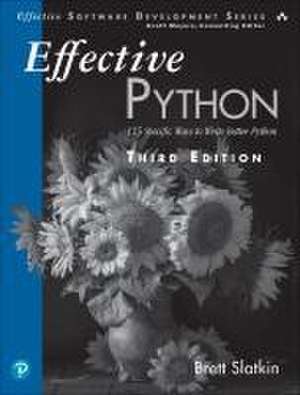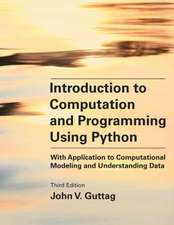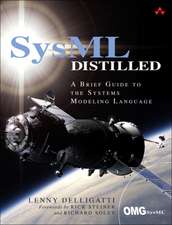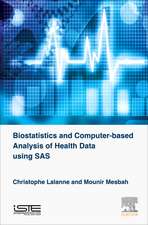Effective Python: Effective Software Development Series
Autor Brett Slatkinen Limba Engleză Paperback – 8 mar 2025
Effective Python aims to provide the reader with an understanding of the "Pythonic" way of writing programs: the best way to use Python. New program- mers will learn the best practices of Python's features. Experienced programmers will learn how to embrace the strangeness of a new tool with confidence.
Like other Effective books, this book will be organized in a series of short items. Each chapter will cover a broad but related set of subjects. Each item will provide clear and concise guidance to the reader about how they can write Python programs more effectively. Each item will provide advice on what to do, what to avoid, how to strike the right balance, and why this is the best choice. Effective Python will prepare growing programmers to make a big impact using Python.
| Toate formatele și edițiile | Preț | Express |
|---|---|---|
| Paperback (2) | 280.54 lei 3-5 săpt. | +30.92 lei 4-10 zile |
| Pearson Education – 15 noi 2019 | 280.54 lei 3-5 săpt. | +30.92 lei 4-10 zile |
| Pearson Education (US) – 8 mar 2025 | 433.76 lei 3-5 săpt. |
Preț: 433.76 lei
Preț vechi: 542.20 lei
-20% Nou
83.01€ • 86.34$ • 68.53£
Carte disponibilă
Livrare economică 24 martie-07 aprilie
Specificații
ISBN-10: 0138172188
Pagini: 672
Dimensiuni: 177 x 231 x 32 mm
Greutate: 1.29 kg
Ediția:3. Auflage
Editura: Pearson Education (US)
Seria Effective Software Development Series
Descriere
When people first learn Python they immediately feel empowered to write code to accomplish the task at hand. But Python has unique strengths and charms that can be hard to grasp. Programmers from other languages often approach Python from a limited mindset instead of embracing its full expressivity. New programmers go too far in the other direction, using Python's dynamic features to set themselves up for difficulties in the future.
Effective Python aims to provide the reader with an understanding of the "Pythonic" way of writing programs: the best way to use Python. New program- mers will learn the best practices of Python's features. Experienced programmers will learn how to embrace the strangeness of a new tool with confidence.
Like other Effective books, this book will be organized in a series of short items. Each chapter will cover a broad but related set of subjects. Each item will provide clear and concise guidance to the reader about how they can write Python programs more effectively. Each item will provide advice on what to do, what to avoid, how to strike the right balance, and why this is the best choice. Effective Python will prepare growing programmers to make a big impact using Python.
Notă biografică
Cuprins
- Preface
- Chapter 1 Pythonic Thinking
- Chapter 2 Lists and Dictionaries
- Chapter 3 Functions
- Chapter 4 Comprehensions and Generators
- Chapter 5 Classes and Interfaces
- Chapter 6 Metaclasses and Attributes
- Chapter 7 Concurrency and Parallelism
- Chapter 8 Robustness and Performance
- Chapter 9 Testing and Debugging
- Chapter 10 Collaboration
- Index



















